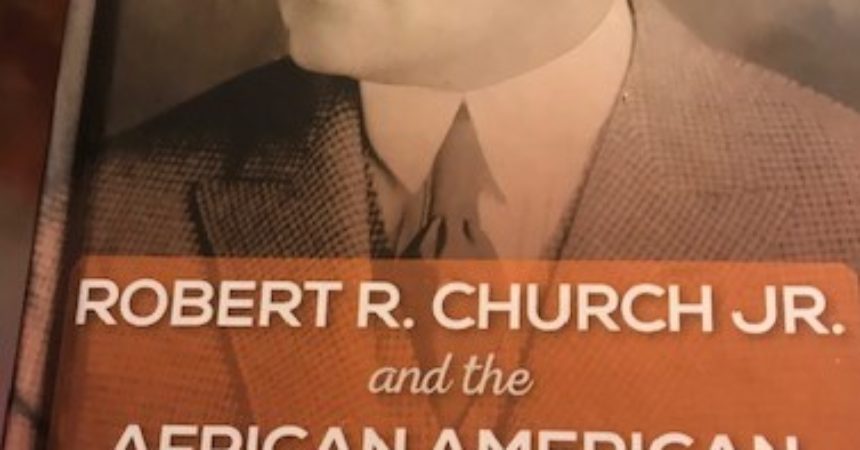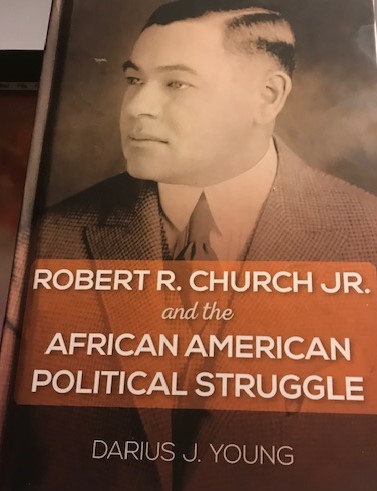
Author Darius J. Young brings Robert R. Church’s work into focus
Book Review
By Larry E. Rivers
The Book: Robert R. Church Jr. and the African American Political Struggle by Darius J. Young (Gainesville: University Press of Florida, 2019), pp. 177. $80.00
This engaging biography focuses on the life of Robert Church, Jr., one of the most iconic Black leaders in Tennessee and the South during the period from 1908 to 1952. The author, Darius J. Young, an associate professor history at Florida A&M University, brings the great work and accomplishments of Robert Church, Jr. out of the shadows, and places him among other great political leaders of his time, such as James Weldon Johnson, Walter White, W. E. B. Du Bois, A. Philip Randolph, Marcus Garvey and others. Young concentrates particularly on the interesting and complex life of Church over a five-decade period.
In six chapters and an epilogue, Young details Robert Church, Jr.’s life from childhood as an elite-upper-class lad to his political influence as a race leader in Memphis, Tenn. Robert Church, Jr.’s father, Robert Church, Sr., was born in Holly Springs, Miss., in 1839 to a White enslaver named Charles Beckwith Church, who owned a steamboat transit company. Church, Sr. knew little about his mother Lucy, except that she became the property of an enslaver from Louisiana. Lucy remains with him until her death in 1851. Taking what he had learned from his father, Charles Beckwith Church, Church, Sr. starts several businesses in Memphis on famous Beale Street. His greatest accomplishment came in the establishment of the Solvent Savings Bank of Memphis. During the 1866 Memphis riots, several incidents impact Church, Sr.’s life: he survives a shooting to the head, and he divorces his first wife, Louisa Ayers Church. Two children came from that first union, Thomas and Mary. Robert Church, Sr. marries his second wife Anna Wright Church in 1885. Due to her background, class, and education, Anna surpasses Church’s upbringing since she could trace her birth to free Blacks in antebellum Memphis. Born to a prominent family in Tennessee, she becomes a musician and school teacher. Robert Church, Sr. and his wife, Anna Wright Church would have two children: Annette and Robert, Jr.
Robert and Anna Church, Sr. try to shield Robert, Jr. and his sister from racism and discrimination. Like children of his social and economic class, Robert, Jr. attends a private kindergarten as well as the Julia B. Hooks Elementary School. He also attends private Black Episcopal parochial schools in Memphis. In preparation to take over the family real estate business and the presidency of the Solvent Savings Bank one day, Robert Junior matriculates at Oberlin College in Ohio for several years, but ultimately graduates from the Packard School of Business in New York City.

Conscious of his background, Robert, Jr. seeks to marry a woman of his social class. He rekindles, therefore, a relationship with a childhood sweetheart, Ms. Sara (Sallie) Parodi Johnson. She comes from a prominent family in Washington, D.C., and attends one of the most famous Black high schools in the area, M Street High. Sallie graduates from what later becomes known as the University of the District of Columbia. And she teaches in Washington until her marriage to Church in 1911. For Robert Church, Jr., marrying a woman of Ms. Johnson’s caliber and class makes his parents proud.
With his education and marriage finalized, Robert, Jr. focuses on getting out of the shadows of his prominent father in order to become a man and leader in his own right. That time will come soon when his father dies on August 29, 1912. Church, Jr. becomes the patriarch who takes charge of family affairs. When Church’s Will becomes public, a half-sister born out of wedlock, Laura Church Napier, steps forward to claim her part of the estate to no avail. Unlike Church Sr., Church Jr. did not want to make a name for himself primarily as a businessman, but as a political activist. Because it’s the party that assisted with the liberation of former enslaved Blacks and the party of Abraham Lincoln, Church, Jr. dedicates his adult life to the Republican Party. Much like Frederick Douglass, Church believes that the Republican Party was the only party for Blacks, because Democrats offered little hope in the way of pushing for economic or political rights for African Americans.
Church, Jr. becomes a political power-broker during the 1920s and 1930s. He meets with at least seven presidents, from presidents William H. Taft to Franklin D. Roosevelt. One of his greatest accomplishments would be the formation of the Lincoln Republican League of Tennessee (LRLOT) that registered thousands of voters. It would take some time for Church to accept women into the LRLOT, or any other political organization. But, his attitude toward women participating in politics would change over time due to the strong influence of his women’s-rights half-sister, Mary Church Terrell. Through the power of LRLOT, Church got the attention of most U.S. presidents. In fact, much like Booker T. Washington before him, Church becomes the go-to-man when giving out patronage jobs to Blacks. Not a man who deliberately sought public attention, but preferred to work behind the scenes, it becomes well known by many Memphians that if you wanted a federal job, Church was the man to visit. With all of Church’s power, U.S. presidents, such as Theodore Roosevelt, William H. Taft, Woodrow Wilson, Warren G. Harding, Calvin Coolidge, and Herbert C. Hoover offered, unfortunately, Blacks very little in terms of protecting their constitutional rights. Particularly, Church and other Black Republican leaders put pressure on several presidents to pass the Leonidas Dyer anti-lynching bill with no success. The Fair Employment Practice Committee bill of 1943 even fails due to a Senate filibuster. Lynchings were widespread in Memphis and throughout the South. Church and other Black leaders sought to pressure the government and society to treat Blacks equally in other walks of life as well without much success. In fact, Church had to fight constantly the lily-whites within his own party for equal participation in the Republican political process.
Church pursues various tactics in order to get America to live up to its creed of treating all Americans as first-class citizens, regardless of race, color or creed. He forms another Black political organization known as the West Tennessee Civic and Political League (WTCPL) to get Blacks more active in politics. But, Church had his enemies, such as Edward Hill (Boss) Crump, the city’s mayor, who wanted to neutralize his power and influence. His adversaries and the White media unsuccessfully accuse him of taking bribes, and wrong-doing as it related to the Solvent Bank of Memphis. Nonetheless, Church continues to fight during the 1930s and 1940s to improve the economic and political conditions of Blacks in Tennessee and throughout the South. Still, with all of his work, Church would not outshine his half-sister, Mary Church Terrell. Although the Republican Party did not offer anything of substance to Blacks, both Terrell and Church remained loyal GOP members. Church does not, however, succeed in keeping the majority of Blacks committed to the Republican Party when Democratic presidential candidate, Franklin D. Roosevelt enters the White House, nor did he seem to try.
Unfortunately, much like the plight of some 500,000 Americans each year, Church dies of a heart attack on April 20, 1952. There were over six hundred people who attended his funeral. After his death, the author cogently notes that some residents of Memphis attempted to erase the accomplishments, legacy, and memory of Robert Church, Jr. in several ways. City officials burn his house down, destroy his business building, and the Solvent Savings Bank. To make the erasure of Church’s name complete, the city changes the name of Church Park and Auditorium to the Beale Avenue Park and Auditorium. Today, there are few reminders of Robert Church, Jr. in the city of Memphis.
But, with this insightful well-written biography on the life and times of Robert Church, Jr., this iconic race leader’s productive life story will not be forgotten by future generations.
Larry Rivers is a Distinguished Professor of History at Florida A&M University.







